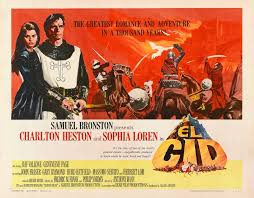Review of El Cid Samuel Bronston movie (1961)
Rae West - 22 February 2024
Bronston presumably may have been related to Bronstein, better known as Trotsky, probably sharing his root beliefs.
This film was made in '70mm Super Technicolor' where the 70 millimetres measurement means the film (yes, silver halide emulsion, with audio track, on flexible plastic, with sprocket holes) was twice the width of 35 mm film, which was a common camera format at the time. Opening titles had simple colours, black-and-white line drawings, and Arabic-sounding music.
Acting styles generally were 'passionate' in the Rudolf Valentino sense.
Colour film and wide screens made possible such films as Ten Commandments (1956), Bridge on the River Kwai (1957), Ben Hur (1959), Lawrence of Arabia (1962), and Doctor Zhivago (1965), with Bronston more or less in the middle and getting Charlton Heston (and Sophia Loren) as actors. I've made no systematic attempt to unearth the races here, but the Jewish element is painfully obvious, just as it was in the black-and-white Soviet cinema, in each case marked by utterly and ruthlessly inaccurate history, a manifestation of the Jewish victory of the Second World War.
We're told at the start (and I think in Italian, in another version) that the scene is war-torn Spain in 1080. This is not a lunar calendar, but in years after 'Our Lord' was born. Spain is half-Moor and half-Christian, and they are menaced by a common enemy from Africa, an Emir called Ben Yusuf. The Moors had invaded Spain (or rather its political parts, not one country) centuries before—and, guess what, the gates of cities were opened by Jews. Mr Bronston's hack writers omit this fact, which is a reason Spaniards have no great love for Palestinians.
An actor in what might be called blackface, but is instead brown, snarls that in Spain Arabs are poets, music-makers, doctors and scientists but should be warriors. There is or was a school of thought (McCabe) that mediaeval Spain had a high Arab civilisation; another school of thought (e.g. Parkinson) thought Arabs occupied everything, after which decline and ruin set in steadily. Everyone seems to agree that the battle of Tours (in France) stopped Moslems entering Europe and the same thing happened later near Vienna.
Anyway, Rodrigo Diaz of Vivar emerges as our hero, wanting peace and allowing five (yes, five) Emirs he captured in one battle to go free, after exchanging eternal pledges never to attack again. Jews (Kol Nidre) and Moslems (taqqiya) both have elaborate rules about deceit by telling lies, but Bronston says nothing about that, either.
Rodrigo's beloved Sophia Loren is her dad's only child, and we have set-piece sword-fights and love scenes for a few hours. And battles (though with far fewer extras than the publicity suggested). The whole dynamic is assumed to be religious; all the mundane business of paying religious officials and paying armies and equipping them is omitted—the usual story for simpletons. Though at the start the bloodthirsty Emir from Africa announces his intention to cause Christians to fight and weaken each other, then move in. There's a lot of appealing to God ("God give me strength") and ethical codes which only lead to complications ("Can a man live without honour?") and what looks like crypto-Jewish evasion ("swearing on the Holy Book" without giving its title).
Refocussing on the post-1945 attitudes of Jews then, we note that the war in Algeria (north Africa, opposite Spain) took place about this time, with France, which in 1954 had lost at Dien Bien Phu. France, bombed extensively by the 'Allies', was having its assets trimmed.
Spain had interests in the Philippines and Cuba—remember the 'Cuba crisis' (1962) happened just after this film. Spain had a lot of Jewish involvement in the so-called 'Spanish Civil War'.
So there were important and instructive events going on. As regards this film, understanding it needs understanding of the concealed Jews, with their global coverage and global money control. They are completely censored from the film, and therefore very easy to miss. Watch for the crypto-presence of them, triumphant after WW2.
Raeto West 22 Feb 2024